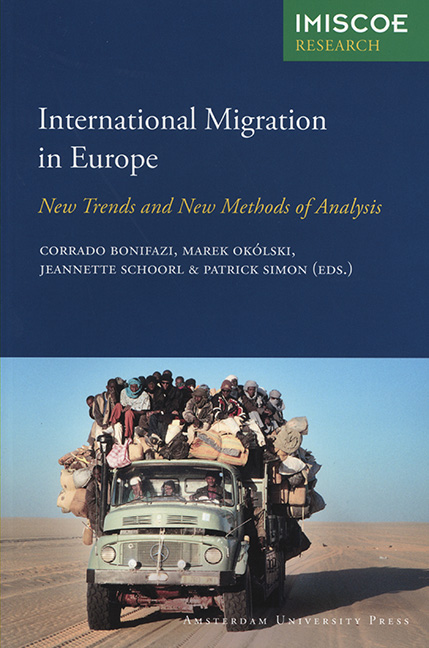Book contents
- Frontmatter
- Contents
- Preface
- 1 Introduction
- PART I NEW FORMS OF MIGRATION IN EUROPE
- PART II EVOLUTION OF REGIONAL PATTERNS OF INTERNATIONAL MIGRATION IN EUROPE
- PART III MEASURING INTEGRATION: IMMIGRANTS AND THE SECOND GENERATION
- PART IV SPECIAL SURVEYS IN INTERNATIONAL MIGRATION STUDIES
- List of Contributors
- Index
- Other IMISCOE Titles
15 - Quality of Asylum Decisions: Uses and limitations of Surveys of Asylum Case Files
Published online by Cambridge University Press: 22 June 2021
- Frontmatter
- Contents
- Preface
- 1 Introduction
- PART I NEW FORMS OF MIGRATION IN EUROPE
- PART II EVOLUTION OF REGIONAL PATTERNS OF INTERNATIONAL MIGRATION IN EUROPE
- PART III MEASURING INTEGRATION: IMMIGRANTS AND THE SECOND GENERATION
- PART IV SPECIAL SURVEYS IN INTERNATIONAL MIGRATION STUDIES
- List of Contributors
- Index
- Other IMISCOE Titles
Summary
Introduction
Asylum-seeking, in addition to regular immigration, is traditionally one of the most common and legal ways of gaining a residence permit in Western European countries. These countries base their admission laws for asylum seekers partially on international obligations (for example, the 1965 Geneva Convention, or the European Convention of Human Rights, Article 3) and partially on their own domestic policies (for example by developing temporary, country-specific admission policies in cases of political unrest or war). Since the end of the 1990s, several treaties have been signed by the member states of the EU with the final aim of fully harmonising asylum policies and asylum law (Baatjes 2004; EC 2006). Within the last decade, there has been a tendency for domestic asylum policies to become more restrictive. In addition, Western European countries like the Netherlands, the United Kingdom, Denmark and Ireland, as well as the United States and Canada, are increasingly putting more emphasis on so-called accelerated procedures, as ‘gatekeepers’ to regular asylum procedures. For the cases that are handled in the accelerated process, the outcome of the decision is the rejection of the application. For the applications treated in the regular asylum procedure, the outcome of the application can be either a refusal or an approval.
Restrictive admission policies and emphasis on accelerated asylum procedures are becoming increasingly criticised by national and international refugee and human rights organisations, lawyers and legal-aid workers, and other stakeholders. The criticisms focus on the fairness, sustainability and quality of asylum decisions made in the accelerated procedures. As a result, not only researchers of international migration but also legal and human rights organisations are increasingly focusing on these topics. This interest has also led to the increasing use of a fairly uncommon research method in the field of migration studies, the so-called survey of asylum case files. In the Netherlands, surveys of case files are mostly carried out in juridical research on topics such as criminal justice or cases investigated by the police, although one can find rare examples of this type of research in migration studies (e.g. Doornhein & Dijkhoff 1995).
- Type
- Chapter
- Information
- International Migration in EuropeNew Trends and New Methods of Analysis, pp. 313 - 330Publisher: Amsterdam University PressPrint publication year: 2008



